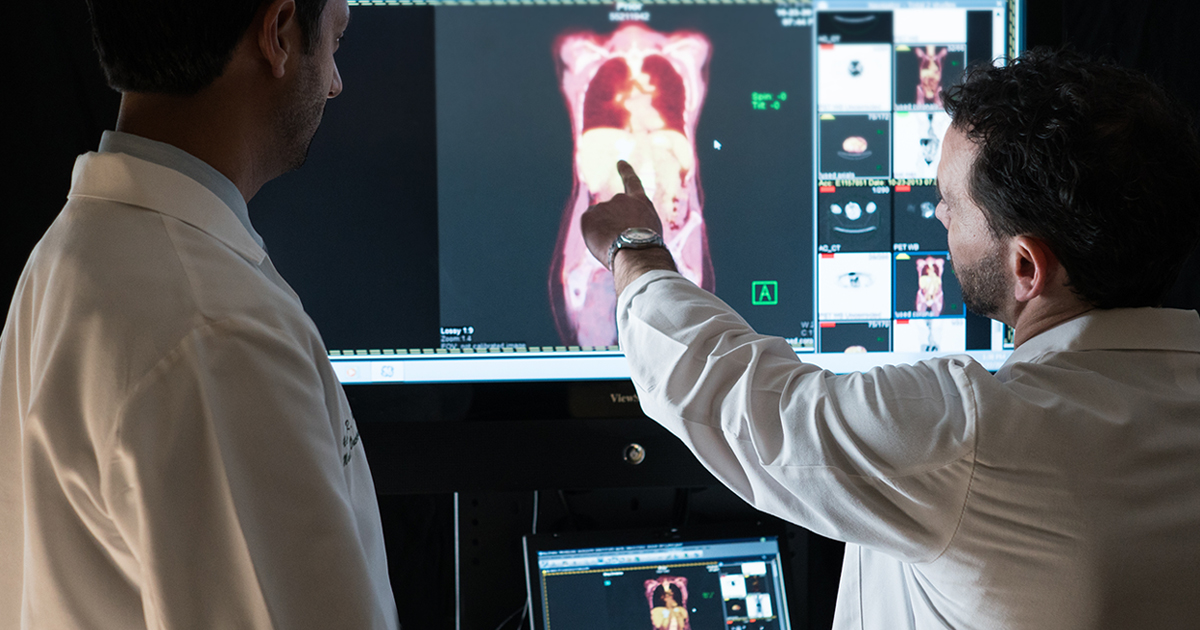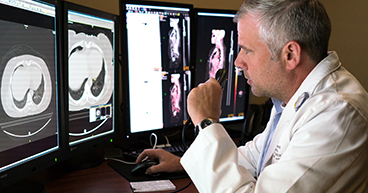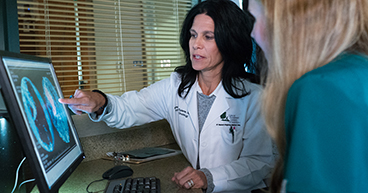
Cancer cells have a way of surviving and thriving even under harsh conditions. They adapt to their surroundings, search out nutrients to feed their growth and often travel and colonize. "Cancer cells are smart," says Pamela Crilley, DO, Chair of the Department of Medical Oncology at Cancer Treatment Centers of America® (CTCA). "They can become resistant to certain treatments. They can also develop new mechanisms that help them evade the immune system or hide away. They can also lie dormant for long periods of time and come back later."
As scientists and oncology specialists learn more about these and other behaviors, they have developed a new generation of tools designed to counteract those mechanisms. This burgeoning field is known as precision medicine, or precision cancer treatment, and it involves understanding and attacking cancer on the cellular level, where its behaviors are encoded in its DNA profile.
The tools of precision medicine
While the field is growing with every new discovery, precision cancer treatment generally involves three main tools: advanced genomic testing, targeted therapies and immunotherapies. Advanced genomic testing offers doctors a way to expose cancer's weaknesses by identifying certain cellular mutations known to make the cancer behave in certain ways. Using information revealed in advanced genomic tests or other analyses, targeted therapy drugs may be used to attack specific genetic features in cancer cells and stop the behaviors, almost like throwing an off switch. Or, depending on whether the tumor has certain mutations known to help the disease hide from the immune system, immunotherapy drugs may be used to help the body better recognize it and fight it off. "Every day, we get smarter," says Maurie Markman, MD, President of Medicine and Science at CTCA®. "It sometimes can sound overly simplistic, but the science is moving so quickly. We’re catching up with understanding what the basic science shows, what the molecular data show, and we’re learning every day how to better treat our patients."
For decades, even a century or longer, doctors have fought cancer with a triad of reliable treatments: surgery, to remove the cancer from the body; radiation therapy, to kill cancer cells with beams of high-energy waves; and chemotherapy drugs, which circulate through the bloodstream and kill or slow fast-growing cancer cells. "We cut it out, burn it out, or try to kill it with poisons," says Shayma Master Kazmi, MD, RPh, Medical Oncologist at our hospital in Philadelphia. "That’s essentially hung in for a lot of years." And with good reason. As these treatments have improved over time, so have the outcomes for millions of cancer patients.
According to the American Society of Clinical Oncology, 3 million cancer survivors were living in the United States in 1971. Today, that number has swelled to more than 15.5 million. From 1975 to1977, the five-year survival rate for all cancers was 49 percent. Today, it's nearly 70 percent for all patients and 82 percent for those younger than 45, according to the National Cancer Institute. "What we do is more sophisticated now, and with a lot less toxicity and side effects, but those three premises still hold," Dr. Kazmi says. "We still operate and remove cancer, we still radiate and burn them, and we still use toxic chemotherapy to try to kill them."
Because these treatments may also damage healthy cells and tissue around the tumor, doctors are always looking for new and better ways to treat cancer with fewer impacts. "Chemotherapy targets, in general, fast-growing cells," says Dr. Kazmi. "However, cells in your hair follicles, your bone marrow, your stomach lining also grow fast. So those are the collateral damage of cancer chemotherapy." That's why some patients on chemotherapy may lose their hair or develop immune deficiencies or gastrointestinal issues. Radiation therapy may kill cancer cells, but it may also kill or damage healthy cells and tissue. Surgery, meanwhile, comes with the risk of excessive bleeding or infections.
Finding better targets
With precision cancer treatment, doctors are looking for—and increasingly finding—ways to better target cancers and their specific genetic features, while also reducing side effects. "Precision cancer treatment means identifying precisely what makes the cancer grow and spread and attacking it with a very specific agent and a tool so that we have the best outcome available, with the fewest possible side effects," Dr. Kazmi says.
For instance, inside the nucleus of every normal cell are 23 chromosomes, each one a tightly wrapped strand of DNA that carries an individual's genetic material. In patients with chronic myelogenous leukemia, one of those chromosomes is abnormal—it’s made of genes from two different chromosomes, fused together. This abnormality sometimes triggers the release of an abundance of enzymes called tyrosine kinases. Normally, this enzyme promotes healthy cell growth, but when the body produces too much of it, the cancerous combination may stimulate uncontrolled growth and cell division. To target and neutralize this behavior, a targeted therapy drug called imatinib (Gleevec®)—technically considered a tyrosine kinase inhibitor—was developed to block these enzymes and stop or slow cancer growth. Imatinib, approved by the U.S. Food and Drug Administration (FDA) in 2001, was one of the first targeted therapy drugs ever developed.
One important way for doctors to discover the presence of those abnormally fused chromosomes or other key mutations, and identify potential targeted therapies that may help, is with advanced genomic testing, a sophisticated laboratory analysis. "You’re really looking at an individual person’s tumor itself," says Ankur Parikh, DO, Hematologist-Oncologist & Medical Oncologist who leads the precision cancer treatment program at our hospital in Philadelphia. "And so, by doing genomic testing, you’re identifying mutations in your tumor and trying to target the right one. The future of cancer care, I think, is really going to change based not just on what type of tumor you have in terms of where it formed in the body, but on that tumor’s genetic makeup."
In fact, the FDA took a breakthrough step in that direction in May, when it approved an immunotherapy drug to treat cancer based not on the tumor's location in the body but on a specific genetic feature found in the cancer’s DNA. The approval cleared the way for the drug pembrolizumab (Keytruda®)—already approved for a number of specific cancer types—to be used on patients with certain metastatic tumors. To qualify for the drug, patients must have inoperable tumors that have genetic features called microsatellite instability-high (MSI-H) or mismatch repair deficiency (dMMR).
The approval was the latest step forward for a class of immunotherapy drugs called checkpoint inhibitors, designed to help immune cells recognize and attack cancer cells. The FDA approved the first checkpoint inhibitor, ipilimumab (Yervoy®), in 2010 for the treatment of metastatic melanoma. In just seven years, the federal agency has approved a total of six checkpoint inhibitors to treat multiple cancers, including lung, kidney and Hodgkin lymphoma. "Immunotherapy is a relatively new treatment that’s come out over the last few years," Dr. Crilley says. "There’s an explosion of information about immunotherapy, and the basic concept is to try to assist patients in using their own immune system to fight the cancer. This had been a dream for many years for medical oncologists to use as a treatment, and we are seeing some very exciting results.”
Advanced genomic testing, targeted therapy and immunotherapy have become important tools in the fight against cancer. In some cases, these new precision weapons are used in combination with traditional standards to fight cancer cells on multiple levels. And through clinical trials and other research, new cancer therapies are being added to the front lines. "There is no magic bullet to cure our cancer or even a particular type of cancer, like breast cancer or lung cancer," Dr. Crilley says. "But the fact is that we are learning what makes cancer start, what makes it grow, what makes it change, and along the way, we will learn enough to positively impact patients."
Learn about the TAPUR trial, a study in precision cancer treatment.



